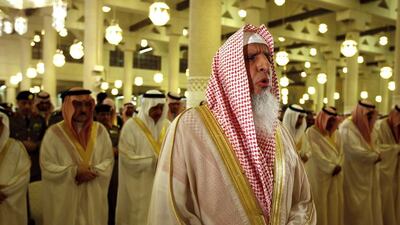Islamic scholars have welcomed a Saudi royal decree to establish a religious centre that will monitor interpretations of Prophet Mohammed’s Hadiths to prevent extremists from using them to justify acts of terror and violence.
The Saudi ministry of information said the King Salman Complex for the Prophet’s Hadiths will become the leading authority on modern day use of the prophet’s teachings, which are used in Islam to govern all aspects of daily life.
Extremist groups have used interpretations to justify heinous acts and urge their followers to wage war in what is an often misinterpreted understanding of “jihad”.
The Saudi ministry of foreign affairs announced that the centre, which will be located in Madinah, will carry out further study the second authoritative source of Islamic teachings “to better understand the meanings of the Hadiths”.
The body, which was announced on Tuesday night, will look to “eliminate fake and extremist texts and any texts that contradict the teachings of Islam and justify the committing of crimes, murders and terrorist acts".
_________________
Read more:
Trump and Saudi king open centre to combat extremism - video
Saudi foreign minister condemns Qatar for supporting terrorism at UN
_________________
On Wednesday, Saudi Arabia's most senior Islamic authority, Grand Mufti Sheikh Abdul Aziz bin Abdullah Al Sheikh, thanked the king for issuing a royal decree to establish the centre.
Sheikh Dr Mohammed bin Nasser Al Khazeem, vice president of general affairs at the Holy Mosque in Makkah, meanwhile said the King Salman Complex for the Prophet’s Hadiths will aim to bring the true meaning of the Hadiths to light and curb extremists' interpretation of them.
“To learn and understand the Hadiths. To liberate people from the darkness of thought, the extremism and misinterpretation of the book of God, and the teachings that have been passed down to us through the Prophet,” he said.
The chairman of the centre has been named as Sheikh Mohammed bin Hassan Al Sheikh, a member of the Council of Senior Scholars, which serves as Saudi Arabia's highest religious body.
Saudi Arabia has government centres for Islamic study which establish a universal method for teaching Islam both in the kingdom itself and abroad in Saudi Arabia's many state-sponsored schools.
However, the study of the Hadiths, which number in the thousands and are equivocally interpreted, have often been less studied and been the source of debate since their origins more than 1,400 years ago.
The new centre will be overseen by a council of senior Islamic scholars from around the world, according to the decree, and will look to establish a more international interpretation of the teachings.
Saudi Arabian clerics, who have historically been dominated by Al Sheikh family, are the originators of the Wahhabi doctrine.
Wahhabism offers a stricter version of Islam that looks to the early days of Islam as the ideal by which to govern modern life and teaches the doctrine in its mosques, universities and schools abroad.
Senior Saudi clergy have denounced militant Islamist doctrines such as those of Al Qaeda or ISIL, while the government, which vets clerics in Saudi Arabia’s 70,000 mosques, has sacked many for encouraging violence or sedition.
Saudi foreign minister Adel Al Jubeir said last month that thousands of extremist clerics had been dismissed, although he gave no time frame.
The government has begun to promote an alternative narrative of Saudi identity that keeps Wahhabism as a central focus, but still allows secular themes such as nationalism and cultural heritage that predates Islam to have a role.

